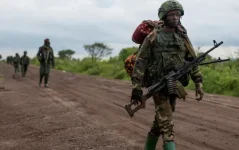M23 rebels, supported by Rwanda, have taken over Masisi town in eastern Democratic Republic of Congo. They captured it on Saturday, according to reports.
Masisi is the second town the M23 has seized in two days in North Kivu province. The area is rich in minerals.
Since 2021, the M23 has gained control of large parts of eastern DR Congo, causing hundreds of thousands of people to leave their homes.
Angola tried to arrange peace talks between the presidents of DR Congo and Rwanda. But the talks failed last month.
Alexis Bahunga, a local official, said he was upset that the M23 had captured Masisi and warned that it would cause a serious humanitarian crisis. He wants the government to strengthen the army in the region.
A Masisi resident said the M23 met with the town's people. The rebels claimed they had come to free the country.
The government of DR Congo has not yet said anything about losing the town.
Masisi is home to around 40,000 people and is about 50 miles north of Goma, the capital of North Kivu province. The M23 briefly took over Goma in 2012.
The M23 also captured the nearby town of Katale on Friday.
Last year, people were afraid the M23 would attack Goma again. Goma has about two million residents. But the fighting slowed down until it started again in early December.
In July, a United Nations report said Rwanda had around 4,000 soldiers fighting with the M23 in DR Congo. Rwanda did not deny this.
Rwanda accused DR Congo's government of not doing enough to end the long conflict in the country's east. Rwanda said DR Congo was working with some people who carried out the Rwandan genocide in 1994. In that genocide, ethnic Tutsis and moderate Hutus were killed.
The M23 was created in 2012 as a split from another rebel group. Its goal was to protect Tutsis in eastern DR Congo. Tutsis had long complained of being mistreated and discriminated against.
But those who criticize Rwanda say it uses the M23 to steal minerals from eastern DR Congo. These minerals include gold, cobalt, and tantalum. They are used to make cell phones and batteries for electric cars.
Last month, DR Congo said it was suing Apple for using these "blood minerals." This led Apple to say it had stopped getting supplies from both DR Congo and Rwanda.
Masisi is the second town the M23 has seized in two days in North Kivu province. The area is rich in minerals.
Since 2021, the M23 has gained control of large parts of eastern DR Congo, causing hundreds of thousands of people to leave their homes.
Angola tried to arrange peace talks between the presidents of DR Congo and Rwanda. But the talks failed last month.
Alexis Bahunga, a local official, said he was upset that the M23 had captured Masisi and warned that it would cause a serious humanitarian crisis. He wants the government to strengthen the army in the region.
A Masisi resident said the M23 met with the town's people. The rebels claimed they had come to free the country.
The government of DR Congo has not yet said anything about losing the town.
Masisi is home to around 40,000 people and is about 50 miles north of Goma, the capital of North Kivu province. The M23 briefly took over Goma in 2012.
The M23 also captured the nearby town of Katale on Friday.
Last year, people were afraid the M23 would attack Goma again. Goma has about two million residents. But the fighting slowed down until it started again in early December.
In July, a United Nations report said Rwanda had around 4,000 soldiers fighting with the M23 in DR Congo. Rwanda did not deny this.
Rwanda accused DR Congo's government of not doing enough to end the long conflict in the country's east. Rwanda said DR Congo was working with some people who carried out the Rwandan genocide in 1994. In that genocide, ethnic Tutsis and moderate Hutus were killed.
The M23 was created in 2012 as a split from another rebel group. Its goal was to protect Tutsis in eastern DR Congo. Tutsis had long complained of being mistreated and discriminated against.
But those who criticize Rwanda say it uses the M23 to steal minerals from eastern DR Congo. These minerals include gold, cobalt, and tantalum. They are used to make cell phones and batteries for electric cars.
Last month, DR Congo said it was suing Apple for using these "blood minerals." This led Apple to say it had stopped getting supplies from both DR Congo and Rwanda.












